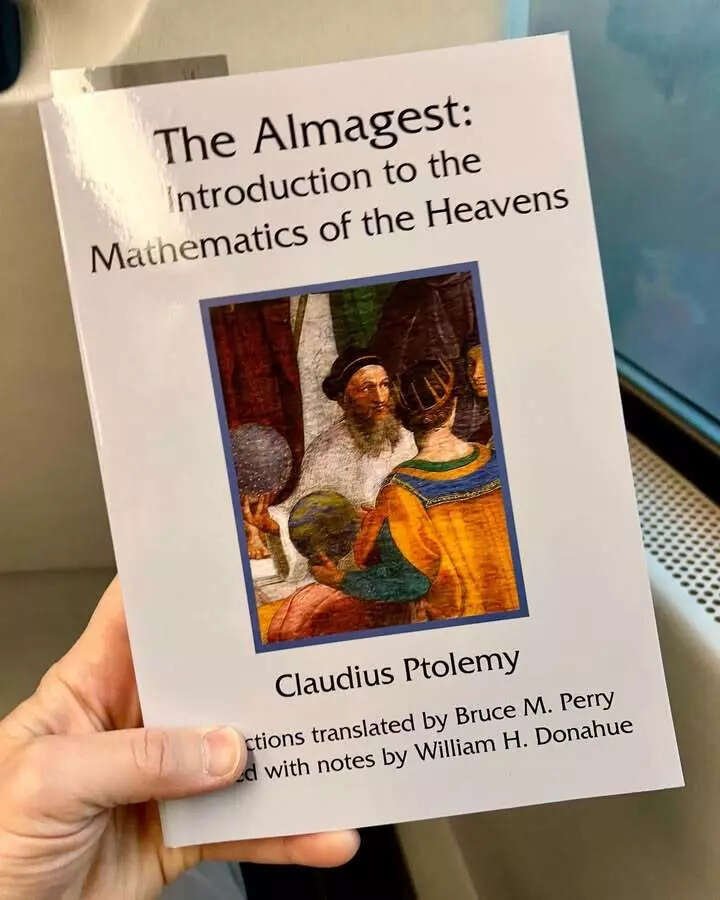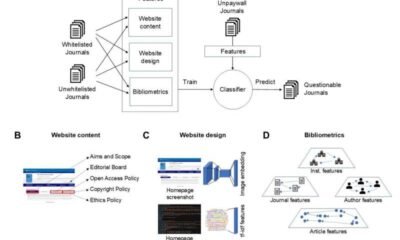Ethics & Policy
12 Life-Changing Books Recommended by Neil deGrasse Tyson

12 Life-Changing Books Recommended by Neil deGrasse Tyson (Picture Credit – Instagram)
1. The Wealth of Nations by Adam Smith
This foundational work establishes the basis for contemporary economic thought, exploring concepts such as the division of labour, productivity, and the dynamics of free markets. Adam Smith’s ‘The Wealth of Nations’ provides insights into how wealth is created and distributed within societies, principles that still shape economic policies worldwide. Neil deGrasse Tyson suggests this book because of its significant impact on understanding the complexities of economic systems. Smith’s analysis offers a framework for comprehending market behaviours and the factors that drive economic growth.

2. How to Lie with Statistics by Darrell Huff
Huff’s book acts as an introduction to critical thinking, revealing methods used to manipulate statistics and mislead people. ‘How to Lie with Statistics’ exposes common statistical tricks, encouraging readers to question presented data and claims. Neil deGrasse Tyson recommends this book for its promotion of scepticism and analytical skills, particularly when interpreting information. The book equips individuals with the ability to assess data critically, identify biases, and avoid being deceived by misleading statistical presentations.
3. The Great Gatsby by F. Scott Fitzgerald
Set during the Roaring Twenties, this timeless novel delves into themes of wealth, love, and the American Dream. Through Jay Gatsby’s poignant story, Fitzgerald explores the moral decline and futile pursuit of pleasure within a materialistic society. Neil deGrasse Tyson’s recommendation underscores the novel’s lasting significance. It encourages a critical examination of human ambitions and societal values, revealing the era’s disillusionment and its impact on contemporary life.
4. The Art of War by Sun Tzu
This ancient Chinese military text provides strategic insights applicable beyond warfare, influencing fields such as business and personal development. Sun Tzu’s ‘The Art of War’ emphasizes adaptability, careful planning, and understanding the opposing side. Neil deGrasse Tyson appreciates the timeless and universal principles found within the text, which are relevant to numerous life scenarios. Its teachings on leadership, strategic decision-making, and competitive dynamics make it a valuable resource for enhancing strategic thought and achieving goals efficiently.
5. The Prince by Niccolò Machiavelli
This influential political treatise provides practical guidance on leadership and the dynamics of power. ‘The Prince’, written by Machiavelli, candidly discusses various ruling tactics, which have ignited debate regarding ethics and governance across centuries. Neil deGrasse Tyson recognizes its importance in examining the complexities inherent in political strategy. Machiavelli’s exploration of political manoeuvring offers insights into the realities of leadership, the use of power, and the strategies employed by rulers, making it a relevant study for understanding political systems and behaviours.

6. Gulliver’s Travels by Jonathan Swift
Swift’s satirical novel follows Lemuel Gulliver’s journeys to imaginary lands, providing a critical commentary on human nature and societal shortcomings. ‘Gulliver’s Travels’ uses inventive storytelling to explore themes of power, corruption, and cultural differences, revealing the absurdities and contradictions within human society. Neil deGrasse Tyson values the book for its lasting observations on human behaviour and social structures. Swift’s work prompts reflection on the flaws and follies of humanity, inviting readers to critically examine the values and norms of their own societies.
7. The Principia by Isaac Newton
Isaac Newton’s seminal work established the foundation for classical mechanics, introducing the fundamental laws of motion and universal gravitation that govern the physical world. ‘Principia Mathematica’ employs a mathematical approach that provides a novel framework for understanding the universe, influencing scientific thought for centuries. This masterpiece exemplifies the transformative power of mathematical reasoning in revealing the underlying laws of nature and the cosmos. Newton’s work remains a cornerstone of modern physics.
8. An Appetite for Wonder by Richard Dawkins
In this personal memoir, Dawkins reflects upon his early years and the development of his profound interest in science and evolutionary biology. ‘An Appetite for Wonder’ chronicles the formative experiences that influenced his career as a renowned evolutionary biologist and author. Neil deGrasse Tyson suggests this book for its inspiring depiction of the pursuit of scientific knowledge and discovery. Dawkins’ narrative provides insight into the motivations and intellectual curiosity that drive scientists to explore and understand the natural world.
9. The Origin of Species by Charles Darwin
Darwin’s revolutionary work introduces the concept of evolution through natural selection, profoundly reshaping our understanding of biology and the natural world. ‘On the Origin of Species’ meticulously details how species adapt and evolve over extensive periods through careful observation and evidence. Neil deGrasse Tyson regards this book as vital for understanding the breadth of life on Earth and the mechanisms driving biological change. Darwin’s insights offer a basis for comprehending the relationships between species and the processes shaping the planet’s biodiversity.
10. Age of Reason by Thomas Paine
Paine’s influential work critiques established religious institutions and champions the principles of reason and independent thought. ‘The Age of Reason’ urges readers to question accepted beliefs and embrace evidence-based understanding as a foundation for their worldview. Neil deGrasse Tyson values this book for its encouragement of critical thinking and the promotion of secularism within society. Paine’s arguments foster a spirit of intellectual inquiry and challenge individuals to examine the basis of their beliefs.
11. The Almagest by Claudius Ptolemy
This ancient astronomical text gathers the collective knowledge of Greek astronomy, presenting a geocentric, or Earth-centered, model of the universe. ‘Almagest’, though based on an outdated framework, illustrates the historical progression of astronomical thinking and the development of early scientific theories. Neil deGrasse Tyson values this book as it offers insight into how scientific thought has evolved. Understanding this evolution showcases how knowledge builds and changes, shaping our current scientific understanding.

12. Unstoppable by Bill Nye
Science educator Bill Nye explores the difficulties and potential solutions regarding climate change in this informative book. He champions scientific innovation and sustainable methods to tackle pressing environmental problems. Neil deGrasse Tyson recommends this book for its hopeful approach to resolving global issues through science. Nye’s insights suggest that science provides the means to understand and address intricate environmental problems. This makes it a call to action for adopting sustainable practices and fostering scientific advancements.
These twelve books, recommended by Neil deGrasse Tyson, offer profound insights into various facets of human knowledge and experience. From scientific discoveries to philosophical inquiries, each work encourages readers to explore, question, and understand the world more deeply. These texts can inspire a greater appreciation for the complexities of the universe and our place within it.
Ethics & Policy
Beyond the AI Hype: Mindful Steps Marketers Should Take Before Using GenAI

In 2025, the prestigious Cannes Lions International Festival of Creativity made an unprecedented move by stripping agency DM9 of multiple awards, including a Creative Data Lions Grand Prix, after discovering the campaigns contained AI-generated and manipulated footage that misrepresented real-world results.
The agency had used generative AI to create synthetic visuals and doctored case films, leading juries to evaluate submissions under completely false pretenses.
This was a watershed moment that exposed how desperately our industry needs to catch up with the ethical implications of the AI tools we’re all racing to adopt.
The Promethean gap is now a chasm
I don’t know about you, but the speed at which AI is evolving before I even have time to comprehend the implications, is making me feel slightly nauseous with a mix of fear, excitement, and overwhelm. If you’re wondering what this feeling is, it has a name called ‘The Promethean Gap’.
German philosopher Günther Anders warned us about this disparity between our power to imagine and invent new technologies and our ethical ability to understand and manage them.
But this gap has now widened into a chasm because AI developments massively outpace our ability to even think about the governance or ethics of such applications. This is precisely where Maker Lab’s expertise comes in: we are not just about the hype; we focus on responsible and effective AI integration.
In a nutshell, whilst we’ve all been busy desperately trying to keep pace with the AI hype-train (myself included), we’re still figuring out how to make the best use of GenAI, let alone having the time or headspace to digest the ethics of it all.
For fellow marketers, you might feel like ethical conduct has been a topic of debate throughout your entire career. The concerns around AI are eerily similar to what we’ve faced before:
Transparency and consumer trust: Just as we learned from digital advertising scandals, being transparent about where and how consumer data is used, both explicitly and implicitly, is crucial. But AI’s opaque nature makes it even harder for consumers to understand how their data is used and how marketing messages are tailored, creating an unfair power dynamic.
Bias and representation: Remember DDB NZ’s “Correct the Internet” campaign, which highlighted how biased online information negatively impacts women in sports? AI amplifies this issue exponentially and biased training data can lead to marketing messages that reinforce harmful stereotypes and exclude marginalised groups. Don’t even get me started on the images GenAI presents when asked about what an immigrant looks like…versus an expat, for example. Try it and see for yourself.
The power dynamic problem: Like digital advertising and personalisation, AI is a double-edged sword because it offers valuable insights into consumer behaviour, but its ethical implications depend heavily on the data it’s trained on and the intentions of those who use it. Tools are not inherently unethical, but without proper human oversight, it can become one.
The Cannes Lions controversy perfectly illustrates what happens when we prioritise innovation speed over ethical consideration, as it results in agencies creating work that fundamentally deceives both judges and consumers.
Learning from Cannes: What went wrong and how to fix it
Following the DM9 controversy, Cannes Lions implemented several reforms that every marketing organisation should consider adopting:
- Mandatory AI disclosure: All entries must explicitly state any use of generative AI
- Enhanced ethics agreements: Stricter codes of conduct for all participants
- AI detection technology: Advanced tools to identify manipulated or inauthentic content
- Ethics review committees: Expert panels to evaluate questionable submissions
These changes signal that the industry is finally taking AI ethics seriously, but we can’t wait for external bodies to police our actions. This is why we help organisations navigate AI implementation through human-centric design principles, comprehensive team training, and ethical framework development.
As marketers adopt AI tools at breakneck speed, we’re seeing familiar ethical dilemmas amplified and accelerated. It is up to us to uphold a culture of ethics within our own organisations. Here’s how:
1. Governance (Not rigid rules)
Instead of blanket AI prohibitions, establish clear ethics committees and decision-making frameworks. Create AI ethics boards that include diverse perspectives, not just tech teams, but legal, creative, strategy, and client services representatives. Develop decision trees that help teams evaluate whether an AI application aligns with your company’s values before implementation. This ensures AI is used responsibly and aligns with company values from the outset.
Actionable step: Draft an ‘AI Ethics Canvas’, a one-page framework that teams must complete before deploying any AI tool, covering data sources, potential bias, transparency requirements, and consumer impact.
2. Safe experimentation spaces
Create environments where teams can test AI applications with built-in ethical checkpoints. Establish sandbox environments where the potential for harm is minimised, and learning is maximised. This means creating controlled environments where AI can be tested and refined ethically, ensuring human oversight.
Actionable step: Implement ‘AI Ethics Sprints’, where short, structured periods where teams test AI tools against real scenarios while documenting ethical considerations and potential pitfalls.
3. Cross-functional culture building
Foster open dialogue about AI implications across all organisational levels and departments. Make AI ethics discussions a regular part of team meetings, not just annual compliance training.
Actionable step: Institute monthly ‘AI Ethics Coffee Chats’ or ‘meet-ups’ where team members (or anyone in the company) can share AI tools they’re using and discuss ethical questions that arise. Create a shared document where people can flag ethical concerns without judgment.
We believe that human input and iteration is what sets great AI delivery apart from just churn, and we’re in the business of equipping brands with the best talent for their evolving needs. This signifies our commitment to integrating AI ethically across all teams.
Immediate steps you can take today
1. Audit your current AI tools: List every AI application your team uses and evaluate it against basic ethical criteria like transparency, bias potential, and consumer impact.
2. Implement disclosure protocols: Develop clear guidelines about when and how you will inform consumers about AI use in your campaigns.
3. Diversify your AI training data: Actively seek out diverse data sources and regularly audit for bias in AI outputs.
4. Create feedback loops: Establish mechanisms for consumers and team members to raise concerns about AI use without fear of retribution.
These are all areas where Maker Lab offers direct support. Our AI methodology extends across all areas where AI can drive measurable business impact, including creative development, media planning, client analytics, and strategic insights. We can help clients implement these steps effectively, ensuring they are not just compliant but also leveraging AI for positive impact.
The marketing industry has a trust problem and according to recent studies, consumer trust in advertising is at historic lows. The Cannes scandal and similar ethical failures, only deepen this crisis.
However, companies that proactively address AI ethics will differentiate themselves in an increasingly crowded and sceptical marketplace.
Tech leaders from OpenAI’s Sam Altman to Google’s Sundar Pichai have warned that we need more regulation and awareness of the power and responsibility that comes with AI. But again, we cannot wait for regulation to catch up.
The road ahead
Our goal at Maker Lab is to ensure we’re building tools and campaigns that enhance rather than exploit the human experience. Our expertise lies in developing ethical and impactful AI solutions, as demonstrated by our commitment to human-centric design and our proven track record. For instance, we have helped our client teams transform tasks into daily automated deliverables, thus achieving faster turnarounds, freeing up time for more valuable and quality work. We are well-equipped to guide clients in navigating the future of AI responsibly.
The Cannes Lions controversy should serve as a wake-up call because we have the power to shape how AI is used in marketing, but only if we act thoughtfully and together.
The future of marketing is about having the wisdom to use them responsibly. The question is whether we will choose to use AI ethically,
Because in the end, the technology that serves humanity best is the most thoughtfully applied.
Ethics & Policy
HBKU to host landmark conference on AI Ethics this September

Taking place September 28-29, at Qatar National Convention Centre (QNCC), “AI Ethics: The Convergence of Technology and Diverse Moral Traditions” centrally considers the impact of AI on culture, tradition, and values.
The university, in a statement, said that the conference brings together esteemed academics, policy makers, tech industry experts, ethicists, and others from around the world to tackle one of the most urgent questions of our times: how can AI efficiently and ethically serve humanity In doing so, participants will explore the intersection of foundational and cross-cultural ethical principles with socially disruptive technologies while upholding rich moral legacies, centuries-long scholarship, and diverse perspectives of both secular and religious moral traditions.
By blending advanced technology with deep ethical inquiry, the statement added, the conference also creates a space where technological breakthroughs are measured against values, and progress is guided by purpose.
The two day gathering of experts will explore the critical intersection of artificial intelligence and ethics through six focused thematic tracks, including healthcare, urban design, security, education, finance, and the future of the workplace, reflecting the most pressing contemporary challenges and opportunities.
Through these diverse yet interconnected lenses, the conference aims to shape a more just and human-centered technological future.
Commenting on the conference, President of HBKU Dr. Ahmad Hasnah noted: “AI is reshaping every part of our lives, offering immense opportunities while raising urgent ethical questions. Our region’s strong religious foundations and rich heritage uniquely position us to actively contribute to the global dialogue on AI ethics and to offer humanity alternative ethical frameworks”.
He added: “Through this conference, Hamad Bin Khalifa University is bringing global voices together to ensure that AI serves humanity responsibly, guided by values rooted in fair moral traditions.”
AI Ethics: The Convergence of Technology and Diverse Moral Traditions highlights HBKU’s pioneering role in driving thought leadership in AI Ethics and being a convenor for diverse point of views. The conference follows the successful hosting of the 17th World Congress of Bioethics, organized by HBKU’s Center for Islamic Legislation and Ethics (CILE) and World Innovation Summit for Health (WISH), the global health initiative of Qatar Foundation
Ethics & Policy
Leadership and Ethics in an AI-Driven Evolution

Hei, det ser ut som du bruker en utdatert nettleser. Vi anbefaler at du har siste versjon av nettleseren installert. Tekna.no støtter blant annet Edge,
Firefox, Google Chrome, Safari og Opera. Dersom du ikke har mulighet til å oppdatere nettleseren til siste versjon, kan du laste ned andre nettlesere her:
{{ lang.changeRequest.changeSubmitted }}
Om foredragsholderen
{{state.speaker.FirstName}} {{state.speaker.MiddleName}} {{state.speaker.LastName}}
{{state.speaker.JobTitle}}
{{state.speaker.Workplace}}
{{state.speaker.Phone}}
Del
-

 Business6 days ago
Business6 days agoThe Guardian view on Trump and the Fed: independence is no substitute for accountability | Editorial
-
Tools & Platforms3 weeks ago
Building Trust in Military AI Starts with Opening the Black Box – War on the Rocks
-

 Ethics & Policy1 month ago
Ethics & Policy1 month agoSDAIA Supports Saudi Arabia’s Leadership in Shaping Global AI Ethics, Policy, and Research – وكالة الأنباء السعودية
-

 Events & Conferences4 months ago
Events & Conferences4 months agoJourney to 1000 models: Scaling Instagram’s recommendation system
-

 Jobs & Careers2 months ago
Jobs & Careers2 months agoMumbai-based Perplexity Alternative Has 60k+ Users Without Funding
-

 Education2 months ago
Education2 months agoVEX Robotics launches AI-powered classroom robotics system
-

 Funding & Business2 months ago
Funding & Business2 months agoKayak and Expedia race to build AI travel agents that turn social posts into itineraries
-

 Podcasts & Talks2 months ago
Podcasts & Talks2 months agoHappy 4th of July! 🎆 Made with Veo 3 in Gemini
-

 Podcasts & Talks2 months ago
Podcasts & Talks2 months agoOpenAI 🤝 @teamganassi
-

 Education2 months ago
Education2 months agoAERDF highlights the latest PreK-12 discoveries and inventions























